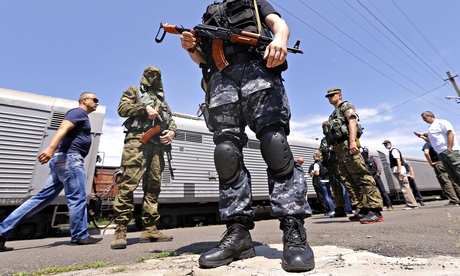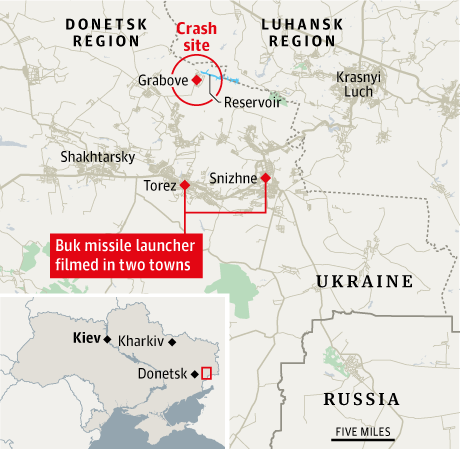MH17 crash: Kerry lays out evidence of pro-Russia separatists' responsibility
US
secretary of state lists 'enormous input that points fingers' and urges
Moscow to act as rebels move victims' bodies from crash site
secretary of state lists 'enormous input that points fingers' and urges
Moscow to act as rebels move victims' bodies from crash site

Pro-Russia separatists guarding the train station where bodies of MH17 victims have been taken. Photograph: Robert Ghement/EPA
The US secretary of state, John Kerry, has said all the evidence surrounding the downed Malaysia Airlines flight MH17 points towards pro-Russia separatists in eastern Ukraine being to blame. He spoke out as bodies of victims were moved by rebels on to trains several miles from the crash site.
Kerry appeared on all five major US Sunday talkshows to lay out the Obama administration's
case against the separatists and to call on Russia to act and stop them
from blocking an investigation into the firing of a surface-to-air
missile that brought down the plane on Thursday, claiming 298 lives.
"We
have enormous input about this that points fingers," Kerry told CNN's
State of the Union. "It is pretty clear that this was a system from
Russia, transferred to separatists. We know with confidence that the
Ukrainians did not have such a system anywhere near the vicinity at that
point of time."
He said the US knew that in the last month there
had been a "major flow of arms and weapons from Russia to the eastern
part of Ukraine and turned over to the separatists".
Kerry said
social media reports and US surveillance put the missile system in
question in the vicinity of the crash before the tragedy.
"We know
because we observed it by imagery that at the moment of the shootdown
we detected a launch from that area," he said. "Our trajectory shows
that it went to the aircraft.
"We also know to a certainty that
social media immediately afterwards saw reports of separatists bragging
about knocking down a plane and then the so-called defence minister of
Donetsk, Igor Strelkov, posted a report bragging about the shoot-down of
a transport plane."
The case against the separatists was further
backed by evidence from voice intercepts and a video of a launcher
moving back into Russia with at least one missing missile, said Kerry.
Kerry called on Russia to "step up publicly and join in the effort to make sure there is a full fledged investigation".
Last week, the Russian foreign minister, Sergei Lavrov, said the US president, Barack Obama, should "stop lecturing Russia".
Kerry said he had spoken to Lavrov on Saturday. "It was a direct and tough conversation," he said.
Dianne
Feinstein, chairman of the Senate select committee on intelligence,
told CNN the type of equipment Russia had supplied to the separatists
should only go to someone with "an ethical compass".
"Now we find out it's been given to separatists who are in many respects thugs. And it's been used in a very terrible way."
"The
nexus between Russia and the separatists has been established very
clearly," Feinstein added. "So the issue is, where is [the Russian
president, Vladimir] Putin? I would say: 'Putin, you have to man up. You
have to say this was a mistake,' which I hope it was."
Putin has
urged the pro-Moscow rebels in eastern Ukraine to cooperate and insisted
that an international investigation must not leap to conclusions.
Moscow denies involvement and has pointed the finger at Kiev's military.
Ukraine
and its western allies accuse Moscow of fuelling a pro-Russia uprising
that threatens to break up the former Soviet republic of 46 million
people. Russia denies orchestrating the unrest and says Ukraine's
attempts to end it by military force are making the situation worse.
On
Sunday, the bodies of the victims were loaded on to three railway
carriages, apparently with refrigerator capability, standing at the
train station in the town of Torez, several miles from the crash site in
the Donetsk region of eastern Ukraine.
The Guardian witnessed the
arrival of a delegation from the international monitoring body the
Organisation for Security and Cooperation in Europe (OSCE) at around
midday local time on Sunday to inspect the wagons, accompanied by a
convoy of heavily armed and nervous rebels.
As they opened the
metal door to one of the carriages to inspect the interior, a stench of
death wafted out, and black body bags were visible inside.
"The
special monitoring mission in its third day dealing with the incident
has now monitored the location where bodies are being refrigerated in
three wagons," said Alexander Hug, the deputy chief of the mission.
"We have not been able to count them as that would be too difficult in this situation."
Michael
Bociurkiw, the spokesman for the mission, added: "Going inside the
wagons is impossible without special equipment. The stench is very, very
bad."
The OSCE, which has had its access to the crash site itself
limited in recent days, left in a convoy to return to the crash site.
There
have been no international investigators at the scene. Ukrainian
authorities say they are setting up facilities for relatives to stay and
autopsies in the city of Kharkiv, about 200 miles away.
Armed
separatists at the scene refused to say how many bodies were in the
train carriages or when they would leave. The train driver told the
Guardian he had no idea of the train's destination.
The local
department of Ukraine's emergencies ministry in the eastern Donetsk
region said on Sunday that 196 bodies had been found at the site where
the Malaysian airliner crashed.
"As of 7am on 20 July, in the
Shakhtarsky region of the crash site of the Boeing 777, 196 bodies were
found," it said in a statement, adding that divers were involved in the
search because the area included a reservoir.
It also emerged on
Sunday that the UN security council was considering a draft resolution
to condemn the "shooting down" of a Malaysian passenger plane in
Ukraine, demand armed groups grant access to the crash site, and call on
states in the region to cooperate with an international investigation.
Australia
– which lost 28 citizens – circulated a draft text, seen by Reuters, to
the 15-member security council late on Saturday, and diplomats,
speaking on condition of anonymity, said it could be put to a vote as
early as Monday.
The draft resolution "demands that those
responsible for this incident be held to account and that all states
cooperate fully with efforts to establish accountability".
It
"condemns in the strongest terms the shooting down Malaysia Airlines
flight MH17 … resulting in the tragic loss of 298 lives" and "demands
that all states and other actors in the region refrain from acts of
violence directed against civilian aircraft."
Russia's UN mission declined to comment on the draft security council resolution.

No comments:
Post a Comment